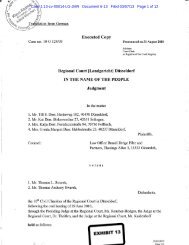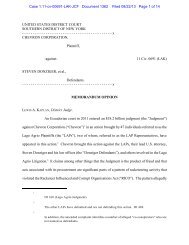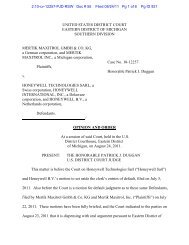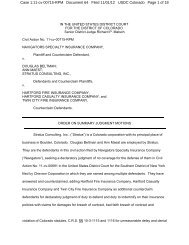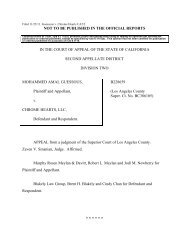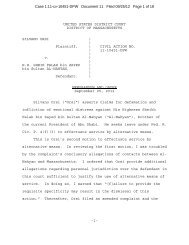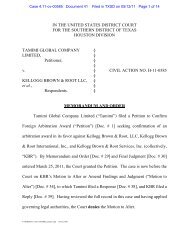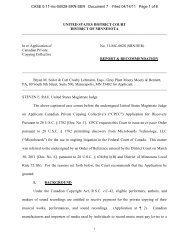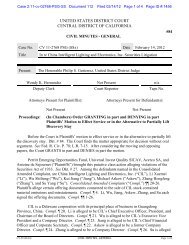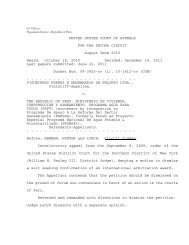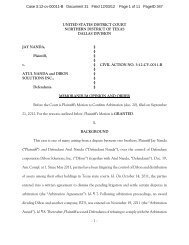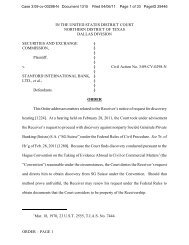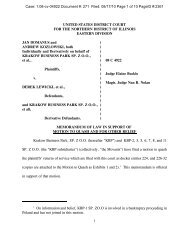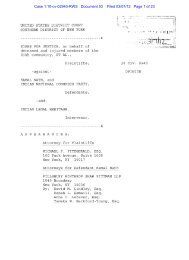Hyundai Securities Co. v. Lee (Cal. Ct. App. 2013) - Letters Blogatory
Hyundai Securities Co. v. Lee (Cal. Ct. App. 2013) - Letters Blogatory
Hyundai Securities Co. v. Lee (Cal. Ct. App. 2013) - Letters Blogatory
You also want an ePaper? Increase the reach of your titles
YUMPU automatically turns print PDFs into web optimized ePapers that Google loves.
process or lacked impartiality or integrity, was without jurisdiction, was without notice,<br />
or was in conflict with <strong>Cal</strong>ifornia public policy or another judgment. (§ 1716.) Unless<br />
one of the specified defenses applies, the court “shall recognize a foreign-country<br />
judgment to which [the Act applies].” (§ 1716, subd. (a).) The Act does not apply, inter<br />
alia, to a fine or penalty. (§ 1715, subd. (b)(2).)<br />
C. Rules of Interpretation<br />
“Our fundamental task in interpreting a statute is to determine the Legislature‟s<br />
intent so as to effectuate the law‟s purpose. We first examine the statutory language,<br />
giving it a plain and commonsense meaning. We do not examine that language in<br />
isolation, but in the context of the statutory framework as a whole in order to determine<br />
its scope and purpose and to harmonize the various parts of the enactment. If the<br />
language is clear, courts must generally follow its plain meaning unless a literal<br />
interpretation would result in absurd consequences the Legislature did not intend. If the<br />
statutory language permits more than one reasonable interpretation, courts may consider<br />
other aids, such as the statutes‟ purpose, legislative history, and public policy.<br />
[Citations.]” (<strong>Co</strong>alition of <strong>Co</strong>ncerned <strong>Co</strong>mmunities, Inc. v. City of Los Angeles (2004) 34<br />
<strong>Cal</strong>.4th 733, 737.)<br />
D. Procedure Under the Act<br />
The Act states that “the issue of recognition shall be raised by filing an action<br />
seeking recognition of the foreign-country judgment” (§ 1718, subd. (a)), and authorities<br />
suggest that the procedures associated with any action set forth in the <strong>Co</strong>de of Civil<br />
Procedure are applicable to an action filed under the Act. In Renoir v. Redstar <strong>Co</strong>rp.<br />
(2004) 123 <strong>Cal</strong>.<strong>App</strong>.4th 1145, arising under a predecessor of the Act, we held that the<br />
Uniform Foreign Money-Judgments Recognition Act then in effect “requires that foreign<br />
country money judgments be enforced by bringing an action, and, as in other actions, a<br />
summons must be served to obtain personal jurisdiction over a defendant (<strong>Co</strong>de Civ.<br />
Proc., § 410.50, subd. (a)).” (Renoir v. Redstar <strong>Co</strong>rp., supra, 123 <strong>Cal</strong>.<strong>App</strong>.4th at p.<br />
6



